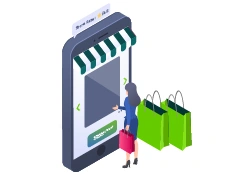Evaluating POS solution for your retail business
Starting a new business in the retail industry — an arena already saturated with competition, shifting consumer preferences, and fast-paced technological evolution — is no small feat. Entrepreneurs entering this space have to make countless decisions that will determine the success or failure of their venture. From establishing the right business model and creating brand awareness to hiring an efficient workforce and selecting the right tools for managing daily operations, every step requires careful consideration.
Among these crucial decisions, choosing the right Point of Sale (POS) solution often doesn’t get the attention it deserves — but it can make or break your business efficiency.
A robust POS system isn’t just about billing; it’s the heart of retail operations, connecting inventory, payments, customer engagement, and analytics into one integrated platform. The right POS system streamlines sales transactions, enhances customer satisfaction, and provides actionable data that helps business owners make smarter decisions.
Modern retail demands agility. Whether you’re running a small boutique or managing a multi-store enterprise, the POS solution you choose defines how smoothly your business operates. There are numerous types of POS systems available — desktop POS, mobile POS, self-checkout counters, and even cloud-based systems that integrate with eCommerce platforms.
The question most retailers ask is simple yet vital:
“Which POS solution is the most suitable for my business?”
The answer isn’t universal — it depends on several critical factors. In this article, we’ll explore these factors in detail, helping retailers evaluate and select the most appropriate POS solution based on their unique needs, growth plans, and operational structure.
1. Size of the Business
The size and scale of your retail business are the foundation for determining which POS system will serve you best. Different store formats demand different technological infrastructures.
Large Format Retail Stores
If you are launching large retail outlets or departmental stores, where multiple sales counters operate simultaneously and thousands of transactions occur daily, a desktop POS setup is typically the best choice. These systems are built for stability, high transaction volume, and comprehensive integration capabilities.
Additionally, incorporating mobile POS (mPOS) units or self-checkout kiosks can significantly enhance the customer experience by reducing queue times and giving customers more flexibility in how they pay. In large stores, hybrid setups combining traditional and modern POS types often deliver optimal results.
For example, supermarkets and hypermarkets benefit from having dedicated billing counters with desktop POS, while floor staff use mPOS devices to assist customers directly in the aisles. This hybrid approach minimizes waiting times and increases throughput during peak hours.
Small and Medium Retail Stores
For smaller stores with moderate customer traffic, a compact desktop POS or an all-in-one POS system that integrates inventory, billing, and reporting in a single device is sufficient. These systems are easy to install and maintain while offering most of the necessary features.
Pop-up Stores and Seasonal Outlets
In contrast, pop-up stores, kiosks, and small seasonal outlets have very different needs. They require lightweight, portable, and cost-effective solutions that can be set up and dismantled quickly. In such cases, mobile POS systems (like Zwing) are ideal. mPOS solutions are often tablet-based, cloud-connected, and allow you to process transactions anywhere — making them perfect for retailers who operate in temporary or flexible spaces.
The key takeaway is that the scale and type of retail operation directly influence which POS solution will yield the highest operational efficiency.

Enhance stock accuracy with Ginesys WMS integrated POS
2. Product Range
The second important consideration is the range and complexity of the products you sell. The nature of your inventory determines how robust your POS system needs to be.
Managing Complex Inventories
Retailers who deal with diverse product categories and multiple variations — for example, apparel (where products vary by size, color, and brand) or electronics (with multiple models, specifications, and warranties) — need a powerful POS system with strong inventory management capabilities.
A desktop POS or an all-in-one POS system is better suited for such scenarios. These systems are capable of handling:
- Large SKU databases
- Variant tracking (size, color, material, etc.)
- Real-time stock updates across multiple locations
- Barcode scanning and batch management
- Integration with backend inventory and procurement systems
Having a robust POS that can sync with inventory management modules helps ensure that stock levels are updated in real time. It also prevents situations like overstocking or stockouts, which can hurt both sales and customer satisfaction.
Simple Product Lines
On the other hand, if you’re operating a boutique store or a niche retail outlet that carries a limited product range — such as handcrafted goods, accessories, or specialty foods — a mobile POS or a lightweight all-in-one POS can easily handle your operational needs.
These systems allow for quick checkouts, simplified inventory tracking, and cloud-based data access — all without the heavy infrastructure costs of a traditional setup.
Scalability Considerations
Even if your product range is small now, it’s important to think about scalability. Your POS should be capable of growing with your business. For example, as you add new categories, suppliers, or store locations, your POS should seamlessly support that expansion. Solutions like Ginesys POS are designed for scalability, allowing small retailers to start simple and expand functionality as their operations grow.

Centralize inventory, sales, and CRM with Ginesys One Retail Suite
3. Processes and Concurrent Applications
One of the biggest mistakes new retailers make is selecting a POS system without considering how it integrates with other essential business applications.
A POS doesn’t operate in isolation — it’s part of a much larger ecosystem that includes:
- Inventory Management Systems
- Procurement and Replenishment Modules
- Customer Relationship Management (CRM)
- Loyalty and Rewards Programs
- Accounting and Financial Reporting Tools
- eCommerce and Omnichannel Platforms
Mapping Integration Points
Before implementing a POS, retailers should map out all the processes and integration points. This ensures that the POS works as a cohesive part of your operational framework. For example, when a sale is made, the system should automatically:
- Deduct the sold quantity from inventory
- Update stock levels in the warehouse or back-end system
- Reflect the transaction in financial records
- Add loyalty points to the customer profile
Without these integrations, retailers end up spending excessive time reconciling data manually, leading to inefficiencies and potential errors.
The Role of Ginesys POS
Modern POS software like Ginesys offers seamless integration across multiple business functions. It supports processes such as:
- Procurement and production tracking
- Stock replenishment and transfer
- Inventory and warehouse management
- Sales and distribution analytics
- Financial management and reporting
- Integration with third-party systems such as eCommerce platforms, digital wallets, or loyalty programs
By unifying all these modules, Ginesys ensures that your retail operations remain synchronized across every department — a key advantage in an increasingly omnichannel retail landscape.
Future-Proofing with APIs and Cloud
In today’s era of digital transformation, choosing a POS system that supports API-based integration and cloud deployment is crucial. This flexibility ensures your POS remains compatible with future tools and platforms as your business evolves.
4. Business Roadmap
Perhaps the most strategic factor when choosing a POS solution is your long-term business roadmap. Retailers need to look beyond the present and envision how their operations will evolve in the next 3–5 years.
Starting Small, Scaling Big
If your goal is to start with one store and expand gradually, your POS should offer scalability and modularity. That means it should be easy to add new stores, users, and features without needing to migrate to a completely new system.
Multi-location Retail Chains
For entrepreneurs planning to launch multiple stores simultaneously, scalability becomes even more critical. In such cases, a centralized cloud-based POS that supports real-time data synchronization between all stores is essential.
Solutions like Ginesys POS are designed to handle this type of complexity. With Ginesys, retailers can:
- Manage multiple locations under one centralized dashboard
- Access real-time sales and inventory data
- Maintain consistent pricing, discounts, and offers across all stores
- Monitor performance and profitability by region or store
- This allows for both operational consistency and strategic agility, two key success factors in modern retail.
Preparing for Omnichannel Retail
Another crucial aspect of your business roadmap is your digital presence. Even if you currently operate physical stores, you may want to expand online through eCommerce or social selling. Your POS must be capable of supporting this omnichannel strategy.
A POS solution that integrates seamlessly with online stores, marketplaces, and ERP systems ensures unified inventory and customer data across channels. This integration prevents discrepancies between online and offline stock and provides customers with a consistent shopping experience.
Case Example
Many of India’s major retailers — from fashion brands to electronics chains — have implemented Ginesys POS or Zwing POS to manage their multi-location operations. These businesses began with a few outlets and scaled to dozens or even hundreds of stores, without needing to switch systems. Ginesys’ architecture allows for this kind of flexible growth, making it a future-ready solution for ambitious retailers.

Explore how Ginesys POS can streamline your retail operations
Additional Considerations When Evaluating a POS System
While the above four factors form the foundation of your POS evaluation, a few additional considerations can make your decision even more effective:
- Ease of Use: A point of sales system should have an intuitive interface that minimizes training time and errors.
- Speed and Reliability: Retail operations can’t afford downtime — look for systems with offline functionality and stable cloud backups.
- Security and Compliance: Ensure your point of sales software supports encrypted transactions, secure data storage, and compliance with local tax and data laws.
- Reporting and Analytics: Modern POS systems offer insights into sales trends, top-performing products, and customer behavior.
- Customer Support: A responsive support team is invaluable, especially during the setup phase or system updates.
By combining these practical considerations with the strategic factors outlined earlier, retailers can confidently select a POS system that aligns with both their operational realities and future ambitions.
Selecting the right POS solution is one of the most important strategic decisions a retailer can make. It’s not just a tool for billing — it’s the central nervous system of your retail operation, connecting sales, inventory, and customer experience in one integrated platform.
Whether you are a startup entering the retail space or an established brand looking to upgrade your systems, your POS should reflect your business scale, product complexity, process ecosystem, and growth roadmap.
Modern solutions like Ginesys POS and Zwing Point of Sales are designed to handle all these requirements with ease. They are robust, scalable, and built for the realities of today’s omnichannel retail environment. From managing complex inventories to enabling multi-store synchronization and seamless integrations, Ginesys helps retailers turn operational efficiency into business growth.
In an industry where customer expectations evolve by the day, having the right point of sales isn’t just about transactions — it’s about transformation.
FAQs: Evaluating POS Solutions for Retail Businesses
1. What is a POS system in retail?
A POS (Point of Sale) system is the software and hardware used to complete sales transactions in a retail environment. It typically includes billing, inventory management, and reporting features.
2. How does a POS help improve customer experience?
A good POS speeds up checkouts, ensures accurate billing, enables multiple payment options, and helps maintain product availability — all of which improve customer satisfaction.
3. What is the difference between a desktop POS and a mobile POS?
A desktop POS is a fixed terminal used at checkout counters, ideal for high-volume stores. A mobile POS (mPOS) is portable, allowing staff to process transactions anywhere in the store or at pop-up events.
4. Can a POS system integrate with eCommerce platforms?
Yes, most modern POS system, integrate with eCommerce platforms to sync inventory, orders, and customer data, enabling true omnichannel retailing. Ginesys POS and Zwing Point of sales softwares do not integrate directly with e-commerce platforms or marketplaces. These integrate via the Ginesys OMS or Browntape.
5. How do I choose between cloud-based and on-premise POS systems?
Cloud-based POS systems are ideal for scalability and remote access, while on-premise systems provide more control over data. The choice depends on your business model and IT capabilities.
6. Is POS data secure?
Leading POS systems use encryption and comply with data protection laws to ensure secure storage and transmission of payment and customer information.
7. How does POS affect inventory management?
POS systems automatically update stock levels with every sale, ensuring real-time inventory tracking and helping avoid stockouts or overstocking.
8. What kind of hardware is required for a POS setup?
Depending on your POS type, you may need barcode scanners, receipt printers, cash drawers, tablets, or integrated terminals.
9. How scalable is Ginesys POS?
Ginesys POS is highly scalable, suitable for single-store startups as well as multi-location chains — with centralized control and flexible configurations.
10. What are the long-term benefits of investing in a good POS solution?
A reliable POS enhances operational efficiency, improves decision-making with data insights, supports omnichannel growth, and builds stronger customer relationships.

